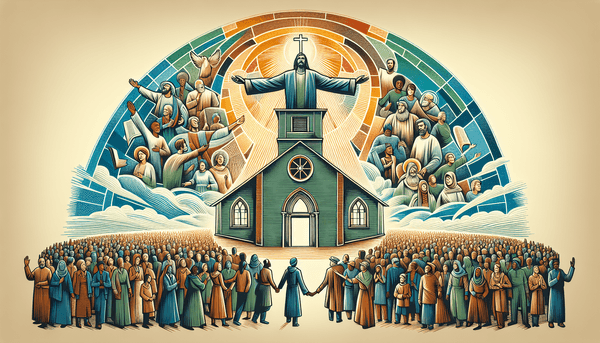The Church as the \"Sacrament of History\
The church, often referred to as the 'sacrament of history,' serves as a visible sign of God's presence, akin to a city on a hill that cannot be hidden (Matthew 5:14-16). Its roots intertwine with human history, evolving alongside mankind, as seen in Ephesians 2:19-22, where the church is built on the foundation of the apostles and prophets. Its role is not passive; it actively shapes history, seeking to bring about the kingdom of God on earth and embodying the faith of those who were commended for their perseverance yet did not receive what was promised (Hebrews 11:39-40), driving change and reflecting God's transformative power through the ages.
The Life and Mission of Jesus Christ
At the heart of the Christian faith is the life and mission of Jesus Christ, whose birth, ministry, and teachings have left an indelible mark on history. Jesus' journey from the humble beginnings in a manger (Luke 2:7) to his extensive ministry, preaching and healing throughout Galilee (Matthew 4:23), and his declaration as the light of the world (John 8:12) underscore his central role in the Christian narrative. The crucifixion and resurrection form the cornerstone of Christian belief (1 Corinthians 15:3-4), offering a message of hope and salvation. Believers are called to emulate Christ's example, walking in his footsteps (1 Peter 2:21) and adopting his mindset (Philippians 2:5), while also navigating life's journey with biblical wisdom, gratitude, love, and forgiveness.
Responding to Criticism of Faith with Humility and Respect
In dialogues about faith, it is imperative to respond with gentleness and respect, giving a defense for one's hope (1 Peter 3:15), while also allowing our speech to always be gracious (Colossians 4:6). Listening quickly and speaking slowly (James 1:19) fosters understanding and builds community, where believers can spur one another toward love and good deeds (Hebrews 10:24-25) and bear each other's burdens (Galatians 6:2). Seeking wisdom and understanding through the Spirit (John 14:26) enables a deeper grasp of the divine and strengthens the bonds of fellowship within the body of Christ.
Conclusion
The tapestry of faith weaves through the ages, with the church, the story of Judas, and the mission of Jesus Christ offering profound insights into the human condition and the divine. As we navigate the complexities of spiritual conversations, it is our love, understanding, and unity that will leave an enduring impact. By viewing the church not as a static institution but as a living entity that evolves with humanity's story, we can better appreciate its role in manifesting God's presence in the world. In reflecting on Judas' betrayal and Jesus' life, we are reminded of the timeless themes of redemption and following Christ's example in our daily lives.
FAQ
Q: What is meant by the church as the \"sacrament of history\"?
A: The church is often referred to as the \"sacrament of history\" because it is seen as a visible sign of God's presence and activity in the world throughout history. The church is a living, evolving institution that is deeply intertwined with the unfolding of human history.
Q: Who was Judas Iscariote?
A: Judas Iscariote was one of the twelve disciples of Jesus, mentioned in the New Testament Gospels. He is known for betraying Jesus to the Jewish authorities in exchange for thirty pieces of silver, leading to Jesus' capture and crucifixion.
Q: Who is considered the chosen one in Christian faith?
A: In Christian faith, Jesus Christ is considered the chosen one, or Messiah, sent by God to redeem humanity from sin.
Q: What is the significance of Jesus Christ's life?
A: Jesus Christ's life is central to the Christian faith. He is revered for his teachings, his sacrificial death on the cross for the sins of humanity, and his resurrection, which is seen as the foundation of Christian hope and salvation.





